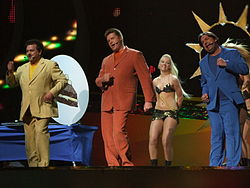Top Qs
Timeline
Chat
Perspective
Estonia in the Eurovision Song Contest
From Wikipedia, the free encyclopedia
Remove ads
Estonia has been represented at the Eurovision Song Contest 30 times since making its debut in 1994. Its first appearance would have taken place in 1993 but a qualification round was installed for seven former Eastern Bloc countries hoping to make their debut in the contest, with Estonia failing to qualify. Estonia has won the contest once, in 2001. The current Estonian participating broadcaster in the contest is Eesti Rahvusringhääling (ERR).
Estonia's first participation in 1994 was unsuccessful, finishing 24th (out of 25). Estonia went on to finish in the top eight in six out of seven contests (1996–2002), with "Kaelakee hääl" by Maarja-Liis Ilus and Ivo Linna fifth (1996), Maarja-Liis Ilus returning to finish eighth with "Keelatud maa" (1997), "Diamond of Night" by Evelin Samuel and Camille sixth (1999), and "Once in a Lifetime" by Ines fourth (2000), before "Everybody" by Tanel Padar, Dave Benton, and 2XL gave Estonia its first victory in 2001. With this, Estonia became the first of the new countries that joined Eurovision in the 1990s to win the contest. "Runaway" by Sahlene then finished third for the hosts in Tallinn in 2002.
Since the introduction of the semi-final round in 2004, Estonia has failed to reach the final on ten occasions and has reached the top ten six times, which is more than any other Baltic country, with "Rändajad" by Urban Symphony sixth (2009), "Kuula" by Ott Lepland sixth (2012), "Goodbye to Yesterday" by Elina Born and Stig Rästa seventh (2015), "La forza" by Elina Nechayeva eighth (2018), "Bridges" by Alika eighth (2023), and " Espresso Macchiato" by Tommy Cash third (2025) as Estonia's top ten results.
Remove ads
History
Summarize
Perspective
Eesti Televisioon (ETV) was a full member of the European Broadcasting Union (EBU) since 1 January 1993, thus eligible to participate in the Eurovision Song Contest since then. It participated in the contest representing Estonia since its 39th edition in 1994. Since 2008, after a restructuring that led to the incorporation of ETV into the current Eesti Rahvusringhääling (ERR) organisation, it is the latter who participates representing Estonia.
Estonia finished 24th (out of 25) on its debut in 1994 and was relegated from the following year's contest. Estonia's record at the contest was a successful one from 1996 to 2002, only failing once to make the top 10 (in 1998 when it ended up in 12th place). Maarja-Liis Ilus and Ivo Linna's fifth-place in 1996 was the first top five ranking for any country, formerly annexed by Soviet Union and therefore unable to participate. Ilus returned to finish eighth in 1997.
The country's first win came in 2001, when Tanel Padar and Dave Benton, along with 2XL, sang "Everybody" and received 198 points, therefore making Estonia the first formerly USSR-annexed country to win the Contest. The 2002 contest was held in Estonia, in the capital city Tallinn, where Sahlene finished third for the hosts (tied with the UK).
From 2004 to 2008 Estonia failed to qualify to the finals, mostly receiving poor results – during that period its best entry was 11th place in the 2004 semi-final by Neiokõsõ with "Tii", sung in the Võro language.
Despite news that Estonia might withdraw from the 2009 contest (set to be held in Moscow, Russia) due to the war in South Ossetia, Eesti Rahvusringhääling (ERR) confirmed that due to public demand, Estonia would send an entry to Moscow.[1][2] The new national final, Eesti Laul, was introduced to select the Estonian entry. According to Mart Normet, one of the producers and one of the Heads of Delegation, the new contest focuses on promoting Estonian music and creativity, encouraging artistic freedom and originality while avoiding formulaic Eurovision songs. Normet described it as a way to highlight authentic Estonian pop music for local audiences, trusting the taste of Estonian listeners rather than tailoring entries for foreign juries.[3]
The winner was Urban Symphony with "Rändajad", which had beaten the televoting favourite, Laura, by the votes of a jury.[4][5]
At the second semi-final of the 2009 contest, Urban Symphony qualified Estonia to the final of the contest for the first time since 2003, receiving 115 points and placing 3rd. The group performed 15th in the final, where it received 129 points, placing 6th out of 25 competing entries as well as being the highest placing non-English language song at the 2009 competition.
In 2010, Estonia failed to qualify to the final, with the song "Siren" by Malcolm Lincoln.
In 2011, Estonia was represented by Getter Jaani with the song "Rockefeller Street". She was the bookmakers' pre-contest favorite for victory along with France. She qualified to the final but eventually placed 24th of 25 entries- tying Silvi Vrait's 1994 result for Estonia's worst placing in the final.
Since 2012, Estonia has achieved five more top ten results. Ott Lepland qualified Estonia to the final of the 2012 contest, with his song "Kuula", ending up fourth in the second semi-final. In the final, he equalled Estonia's result of 1999 and 2009, placing sixth. Elina Born and Stig Rästa finished seventh in 2015. Elina Nechayeva and Alika finished eighth in 2018 and 2023, respectively. Tommy Cash placed third in 2025, giving Estonia its best placement since 2002.
Remove ads
Participation overview
| 1 | First place |
| 3 | Third place |
| ◁ | Last place |
| X | Entry selected but did not compete |
Remove ads
Songs by language
- English (61.7%)
- Estonian (28.1%)
- Italian (3.91%)
- Võro (3.13%)
- Serbian (1.04%)
- German (1.04%)
- Finnish (1.04%)
Hostings
Related involvement
Summarize
Perspective
Conductors
Heads of delegation
Each participating broadcaster in the Eurovision Song Contest assigns a head of delegation as the EBU's contact person and the leader of their delegation at the event. The delegation, whose size can greatly vary, includes a head of press, the performers, songwriters, composers, and backing vocalists, among others.[6]
Costume designers
Commentators and spokespersons
Remove ads
Photo gallery
Remove ads
See also
Notes
- A qualifying round was held for new countries looking to make their debut at the 1993 contest. Estonia failed to progress from this round; entries which failed to progress have subsequently been discounted by the EBU and do not feature as part of the countries' list of appearances.
- The 2020 contest was cancelled due to the COVID-19 pandemic.
- Conducted the Estonian entry at Kvalifikacija za Millstreet.
Remove ads
References
Wikiwand - on
Seamless Wikipedia browsing. On steroids.
Remove ads


















